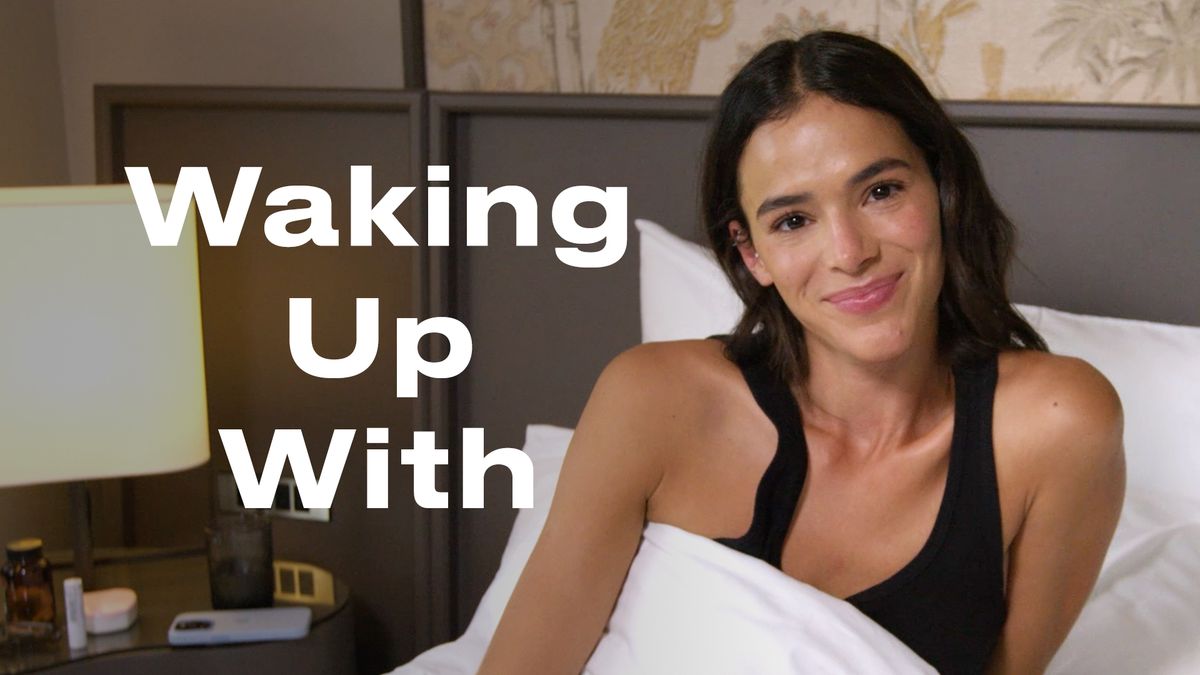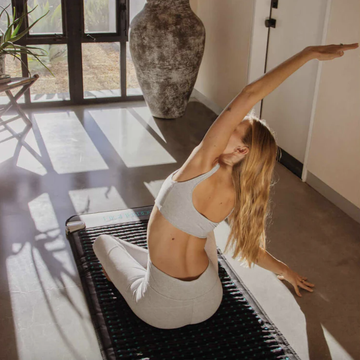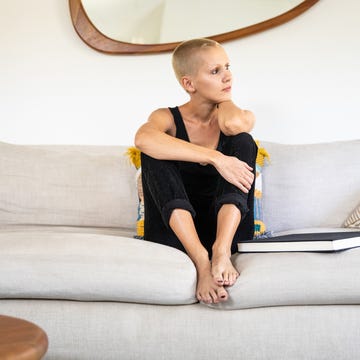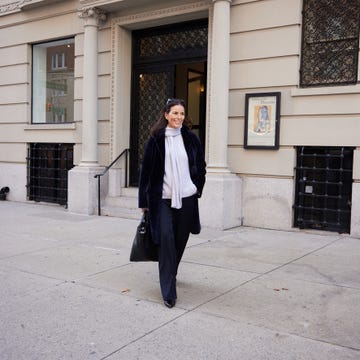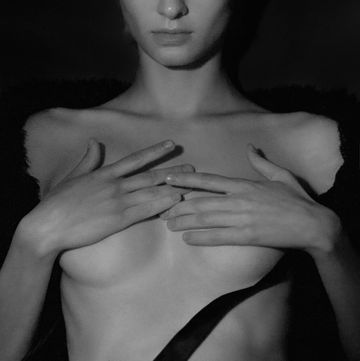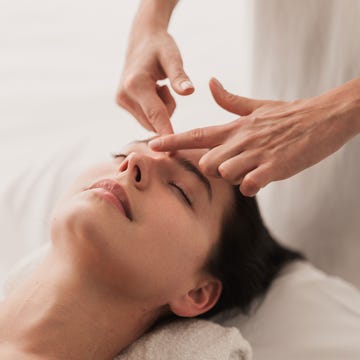I'm about halfway through my phone call with Goldie Hawn when I realize that it feels less like an interview than a therapy session. To be clear, I haven't told the actress any of my issues, because professional boundaries. But as she recalls how lost she felt as a young twenty-something trying to find her place in the world and wonders what that would be like in 2015—with the collective fixation on "likes" and "follows" and the general inability to disconnect from our screens—I feel as if she just gets it. So much so, that when she elaborates on the mindful strategies that have helped her negotiate all this, it's like someone just gave me a cure to all my age (and technology)-related anxieties.
I suppose I shouldn't be surprised by Hawn's needle-sharp wisdom and perspective, since she wrote the book on mindfulness—actually, three: her 2005 memoir A Lotus Grows in the Mud, 2011's 10 Mindful Minutes, and the follow-up, 10 Mindful Minutes: a Journal, which launches today. The newest release is a workbook specifically geared towards parenting and teaching mindfulness in a world where babies are practically born with an iPhone in hand, whilst their parents live tweet the entire experience.
Here, the iconic actress explains how mindfulness helped her find herself, why unplugging is so incredibly important in our screen-obsessed culture, and the one incredibly easy thing you can do to find some inner peace.
10 Mindful Minutes really dives into the importance of practicing meditation and mindfulness in the modern, tech-driven age. How does A Journal supplement that?
You have to prepare yourself first before you can create any kind of change for your loved ones. This book is really about how you can help achieve that for yourself through journaling, and it gives it some guidelines [for that]. It's an extension of the book, but it's also a practical application. It's a way of actually activating some of the things we talked about in the book.
Why do you specifically suggest writing as a way to get started with mindfulness?
I think journaling is an important, intrinsic experience, and a lot of us don't spend enough time on it. It gives you a chance to understand what it is and how to be able to quiet your mind. And it also gives you an exercise in terms of how to engage yourself in a different kind of thinking—changing your negative thoughts to positive ones—ways in which you can do it. When you write things down, it's a very different personal experience and it also works really well on your brain…knowing that there are many ways to accept your day. And also understanding a little bit more about yourself. Everyone needs to engage in that in some way, I think, in order for us to grow.
What led you to mindfulness?
When I was a young girl moving into the industry itself as a dancer, it really was challenging. I was taken out of the chorus line and suddenly put into a position on a television show, moved onto Laugh-In, and became a big deal when I still was not very developed. I mean, our brains aren't finished until we're 24 years old. So it was a lot of assimilating, a very strange life. I was always a performer, always on stage, but I also always believed I was going to go home, open a dance school, get married, and have what you would call a "normal" life. And that was a dream and it's probably every girl's dream on some level, to be a mother and to do this. To me, I was in California to dance. It sounds silly because everybody wants to be a big deal; everyone wants to succeed in their craft, and I was—I was dancing and that's what I wanted to do. But again, we all react differently. I was very connected to my family; I was prepared to go home at some point. And I was 22—so, very young. I started looking into myself to understand why I was feeling this anxiety and why I wasn't feeling this unbridled joy. That really is the beginning of my internal self-discovery on why I was feeling like that; why I was feeling nervous and uncertain and de-stabilized from the life that I thought that I was going to live. From that point on in 1972, I started meditating. And that brought me a tremendous joy and connectivity inside of me.
Hearing your experience is a lesson in itself. Was this the reason why you chose to share it years later?
When I wrote my book [in 2005], I was just sharing my knowledge, and I wanted others to maybe identify on some level. Paying it forward, if you will. And when 9/11 happened, I realized our children were going to be going through a lot of uncertainty and the world had changed really forever on that day, as it has. I believed our children needed to have things in school that created much more resilience for them and allowing them to feel more like children, feel more positive and playful, and really, an ability to relax their minds for learning because a stressed child cannot learn. A fearful child cannot learn. So that's when I started MindUP [Hawn's mindfulness-geared behavioral training program for kids]. But then the parents said, "We want MindUP. We want it for our children, but we also need to do this." So I created 10 Mindful Minutes.
And that was before technology and social media became as integral to our lives as they are now. We need mindfulness training more than ever!
Absolutely. It's crazy. I think all of us are, on some level, addicted to our screens. Look, we go into restaurants, and people aren't talking anymore. They're texting. While they are sitting at a restaurant with each other. So we're losing this intimacy that we need to have as human beings. Because that's really who we are. Technology doesn't do it for us. And one of the reasons why it doesn't is because it doesn't connect us to a human being. It also leads to projection—often times, texting will take you to a place where someone said something in a way they didn't really mean, and it hurts you. Or our young children look at the amount of people that are following them. It's crazy how children and people are measuring their self-worth by the amount of people that may or may not be viewing them or caring about them. So we've expanded, but we've actually shrunk. We need to feel each other's energy, we need to be able to touch each other because this changes our mind. We don't necessarily have to have the answers, but we need to know that we're there, feel the love, to feel the support. And you cannot do that on a tablet. I'm not saying everything is bad about technology, but we are addicted to it.
There's something in the brain called mirror neurons: When you cry, I cry. When you're laughing, I feel like laughing. You can't do that with someone in a technological situation. You can't do that online. You do that together. And that's what makes us human. So the answer is a big fat yes. [laughs]
And I'm sure that as a celebrity, dealing with the online commentary is exponentially worse.
In our profession, we're very, very scrutinized—left, right, and center. There are a lot of challenges with that, because frankly, celebrity or no celebrity, we're just people. And people have emotions and we have hearts and minds, sadness; we have loss—I was losing my father in the hospital when I was doing Laugh-In. And yet we have to go on. We have to be funny; we have to do the things that we promised to do. And when you do those things, you have to really look at your deeper strength to know what your obligations are. Someone gives you a bad review. They can be very personal; they can say very hurtful things. Now, of course, you've got the Internet, and that's horrible. I'm lucky. I've got a lot of people that are pretty wonderful, but at the same time, the things we say are so ugly. You can't imagine. But one thing that I learned very early on, through my understanding of psychology, is that when people look at you, when they see you, they don't really see you. Certainly those of us who are celebrities. They don't know how we wake up in the morning. They don't know what we do for others during the day. They don't know what's in our heart and mind. They have no idea how we were raised. But what they do is they imprint their perceptions and their projections onto you. So therefore, you can't take it personally. If somebody says to you, 'Oh, I think you're horrible, you're butt ugly,' you can't look at that; that's their perception. It's not yours.
Some might argue that it's easier said than done. How do you apply that thinking?
Let's say there is a loss of a part. You really wanted to do that role, but you didn't get it. So you can think about the reasons, but you have to be able to equalize the playing field because everybody has a choice; their choices are their own. And if you're not the choice? So be it. I think putting a scale in your life is really important. Once you get some heavy, 5-lb weight on one end of the scale and it takes you down to rock bottom, you have to be able to find another weight to put on that other side of the scale to give it balance. That is becoming more mindful, becoming more forgiving, understanding others, being more self-aware, and eliminating your negative self-thoughts. These are the weights you've got to keep in the back of your pocket. So when you feel let down, hurt, sad, offended, abused, any of these things, then you take that weight out of your pocket. That's your tool. And you put it back on your scale.
Is there one simple action—kind of Mindfulness for Dummies—that a person who wants to ease into meditation can do to get started?
The important thing about boosting happiness is basically taking time for yourself. So walk—slowly—so you're looking around you. Walk so you're actually focusing on the things around you that you never see; that you never notice. That's one way of creating a walking meditation, and that's important. The other thing is doing things you love to do. For me, I'm a person that loves nature, but there are ways and means in which you can do those things that you love to do. Gathering with your friends; making sure you have a very strong social connection with your friends. Sometimes even pushing yourself to go out when you don't feel like it. If you're feeling down or low, you usually feel better once you go out with your friends and sit down with them and share with them what you're feeling.
But I will say this: The best thing you can do is learn to sit quietly. Tame your mind and learn to meditate. And when I say meditation, I don't mean for an hour, not even 20 minutes—10 minutes, twice a day. Meditation is a prescriptive; it's not a religion. It's been proven to change your brain structure: It thickens your corpus callosum and it also gives equanimity to the brain because it balances and calibrates the left-right hemispheres of your thinking brain. So scientifically, boosting your happiness is a very important thing to do, but I do think that the most important and most lasting effect is to have a practice of sitting and focusing on your problems. You're really training your brain to focus, and you're also training your body and your mind to interconnect, so you have a personal, quiet experience.

